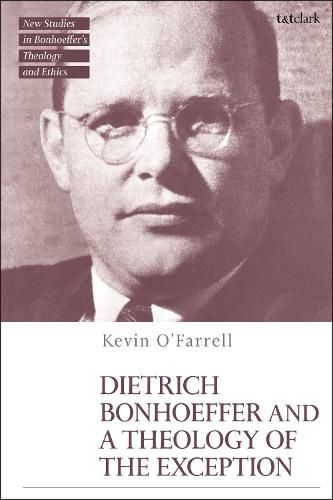Readings Newsletter
Become a Readings Member to make your shopping experience even easier.
Sign in or sign up for free!
You’re not far away from qualifying for FREE standard shipping within Australia
You’ve qualified for FREE standard shipping within Australia
The cart is loading…






Engaging with the many debates about the meaning and character of Bonhoeffer's late resistance theology and action, particularly as it relates to his participation in the attempted coup d'etat against Hitler, this book attends to Bonhoeffer's understanding of the exception. Resisting the common reduction of the exception to a political or ethical concept, O'Farrell argues that the exception for Bonhoeffer is an extraordinary moment in history that disarms persons, impinging on one's understanding of politics and ethics.
Through a wide engagement with the Bonhoeffer corpus, this book claims that this leads to distinctive narrations of key concepts in Bonhoeffer's corpus: responsibility, the free venture, simple obedience, and action beyond the law. It also offers a different portrait of Bonhoeffer to contemporary narrations. The Bonhoeffer that emerges is neither a Niebuhrian realist, a pacifist, or a religious fanatic, but one who is impelled to act apart from the law without this action becoming arbitrary. This Bonhoeffer provides a hopeful political witness that seeks a world beyond the conflicts and divisions of this age.
$9.00 standard shipping within Australia
FREE standard shipping within Australia for orders over $100.00
Express & International shipping calculated at checkout
Engaging with the many debates about the meaning and character of Bonhoeffer's late resistance theology and action, particularly as it relates to his participation in the attempted coup d'etat against Hitler, this book attends to Bonhoeffer's understanding of the exception. Resisting the common reduction of the exception to a political or ethical concept, O'Farrell argues that the exception for Bonhoeffer is an extraordinary moment in history that disarms persons, impinging on one's understanding of politics and ethics.
Through a wide engagement with the Bonhoeffer corpus, this book claims that this leads to distinctive narrations of key concepts in Bonhoeffer's corpus: responsibility, the free venture, simple obedience, and action beyond the law. It also offers a different portrait of Bonhoeffer to contemporary narrations. The Bonhoeffer that emerges is neither a Niebuhrian realist, a pacifist, or a religious fanatic, but one who is impelled to act apart from the law without this action becoming arbitrary. This Bonhoeffer provides a hopeful political witness that seeks a world beyond the conflicts and divisions of this age.